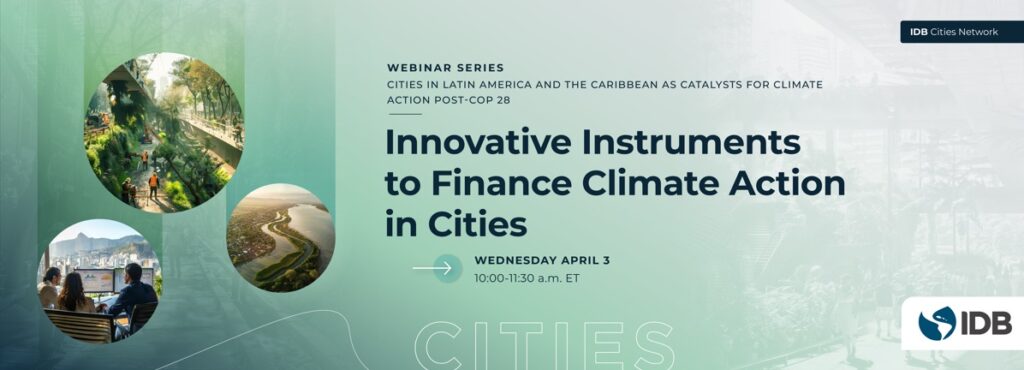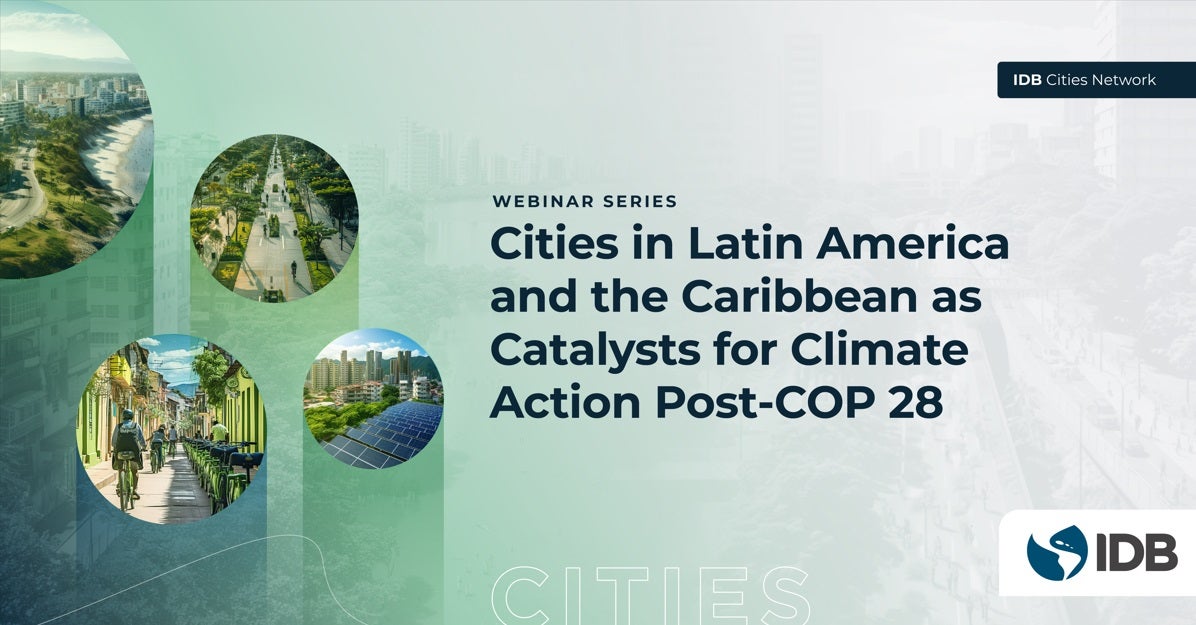Este artículo está también disponible en / This post is also available in: Spanish
The cities of Latin America and the Caribbean (LAC) face enormous challenges and opportunities. Two-thirds of the Latin American population reside in cities of at least of 20,000 inhabitants and 81% live in urban areas. By 2050, it’s projected that over 86% of the region’s population will be urban dwellers.
In terms of challenges, LAC cities are responsible for around 70% of the region’s greenhouse gas emissions and bear over 80% of losses from climate-related disasters. They’re highly vulnerable to heatwaves, the urban heat island effect, and natural disasters, particularly impacting low-income urban households. Furthermore, gender and diversity gaps leave women and minority groups more vulnerable to the impacts of climate change in LAC.
However, cities also present opportunities to drive economic growth and prosperity, contributing over 80% of the global gross domestic product (GDP). They play a pivotal role in combating climate change by reducing greenhouse gas emissions and enhancing urban resilience. In this context, COP28 marked a milestone by recognizing cities’ fundamental role as catalysts for climate action. Understanding these advancements is crucial for driving local action forward. Therefore, this webinar series will delve into the role and tools necessary for cities to enhance climate action.
Through the webinar series “Cities in Latin America and the Caribbean as Catalysts for Climate Action Post-COP28″, the IDB Cities Network will share tools to facilitate local climate action. We’ll explore the importance of multilevel coordination, mainstreaming gender perspectives, and promoting climate finance at the subnational level. Your participation is essential to catalyze this transformation in our cities. Keep reading to find more details.
Webinar 1: Multilevel coordination to drive climate action in cities – March 20, 2024
The first webinar will delve into the role of cities in driving the fulfillment of countries’ Nationally Determined Contributions (NDCs) to the Paris Agreement. Experiences from various stakeholders working on multilevel coordination to promote climate action in cities will be presented, delving into the opportunities arising from COP28, where cities continued to assert themselves as key players in the fight against climate change. Relevant advancements for the cities’ climate agenda will be shared, such as the first Local Climate Action Summit organized by the Presidency of COP28 in Dubai, numerous meetings held at the Multilevel Climate Action Pavilion and at the IDB Pavilion at COP28 in Dubai, and the CHAMP initiative or “Coalition for High Ambition Multilevel Partnerships,” signed by over 70 national governments to encourage collaboration between government levels to increase climate ambition. Additionally, through cities’ experiences, concrete initiatives being carried out to address the challenges of climate change at the local level in collaboration and coordination with the central government will be showcased, relying on multilevel coordination mechanisms and contributing to the achievement of established climate objectives.
Webinar 2: Climate Equity in Cities: Governance, Gender and Urban Resilience – March 27, 2024
The second webinar will address the challenges of working on reducing emissions and climate resilience in cities without leaving anyone behind. We will explore how the impacts of climate change disproportionately affect different gender groups, especially women and girls, and how integrating gender perspectives can strengthen responses to climate change in cities. Gender roles, inequalities, and access to resources will be analyzed through the discussion of statistics and case studies that illustrate these disparities.
Working on climate action in cities while incorporating an equity and inclusion approach presents an opportunity to reduce the gender gap in urban environments, while also generating social and economic benefits such as job creation. In this webinar, projects that incorporate this perspective in cities of Ecuador and Brazil will be presented.
Webinar 3: Innovative Instruments to Finance Climate Action in Cities – April 3, 2024 – Register here
In the last webinar of this series, we will explore the crucial role of subnational climate financing in building resilient and low-carbon urban environments, necessary for fulfilling climate commitments made in the Paris Agreement. Cities play a significant role in designing and implementing climate initiatives and investments for more sustainable urban development; they must be at the forefront of climate action, considering that urban greenhouse gas emissions could be reduced by 90% by 2050. While cities face challenges in accessing subnational climate financing mechanisms, there are increasingly more opportunities and success stories of local governments accessing climate financing. This webinar will serve as a platform to share financial instruments and useful tools for cities.
Successful experiences in implementing innovative climate financing instruments in cities will be presented, as well as experiences of mainstreaming climate perspectives in the financial planning of subnational governments, which will serve as inspiration and guidance for other cities in their search for effective financial solutions for climate change.

Join the conversation
In the IDB Cities Network, we are committed to building a greener and more resilient future for current and future generations. We firmly believe in the power of knowledge exchange to drive the advancement of our cities in the face of the challenges of climate change. These webinars represent an incredible opportunity to broaden understanding of climate action in urban environments through concrete examples of success in cities. Aspects such as climate governance, multilevel coordination, integration of gender perspective into local climate action, and mobilization of financial resources are crucial for incorporating the dimension of climate change into the urban agenda and enhancing the involvement of cities in the region to achieve national and global climate goals.
Join us on this journey to promote more sustainable urban development.


Leave a Reply